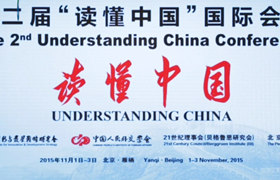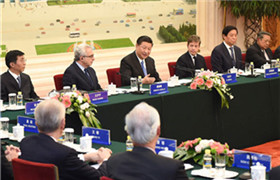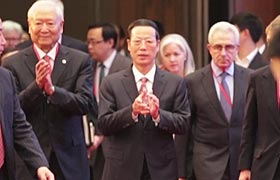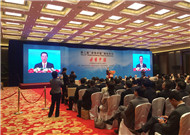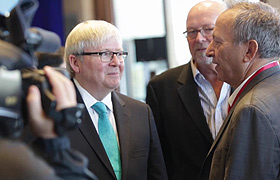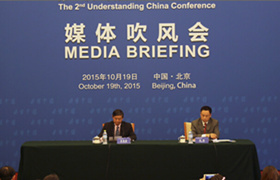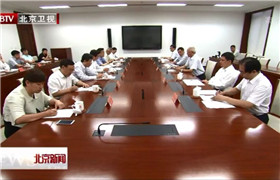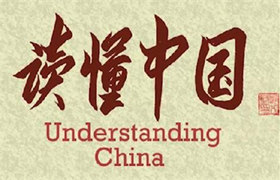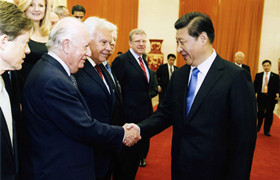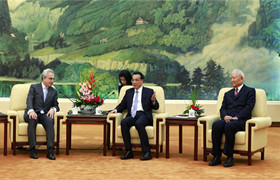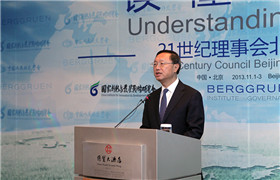- HOME--> Understanding China International Conference
-
China Is Standing at a New Historical Point
Source:CIIDS
—Remarks at the 21st Century Council Beijing Conference
Yang Jiechi, State Councilor of the People’s Republic of China
November 2, 2013
Your Excellency, Chairman of 21st Century Council, Mr. Ernesto Zedillo, Distinguished Guests, Ladies and Gentlemen:
Good morning! The 21st Century Council is a prestigious international think tank, and its members are all prominent figures. First of all, I would like to extend my heartfelt congratulations on the opening of this conference in Beijing and a warm welcome to all of our distinguished guests.
The theme of our conference is "Understanding China”. It not only attests to 21st Century Council's strong interest in China, but also bespeaks, to certain extent, the international community’s desire to know China better and at a more profound level. It is of high practical importance and will help enhance mutual understanding and trust between China and the rest of the world. The Chinese side has attached great importance to the event. This afternoon President Xi Jinping is scheduled to meet with representatives of our conference participants. Yesterday Premier Li Keqiang made remarks at our opening ceremony. Now I would like to avail myself of the opportunity to share my views on China's foreign policy for your thought.
In order to understand China, it is necessary that one view China in the larger context of the development of the world. Today’s world is undergoing profound, complex changes, with new characteristics, developments, and trends continuously emerging in the process. I would like to discuss the most salient of those as follows:
In today’s world things are developing with unprecedented rapidity. A large number of emerging markets and developing countries have embarked on a path of rapid development. More than three billion people worldwide are engaging in the process of industrialization and reaping the benefits of modernization, thereby pushing the cause of human progress to higher levels. With rapid advances in science and technology, the world is ushering in a new scientific and technological revolution. New growth areas keep emerging. Although the profound impact of the global financial crisis lingers, the trend of development worldwide continues unhindered and will not be reversed in the least. It is a common practice nowadays for the different countries to place development at the top of their domestic and foreign policy agendas. How to best achieve development is increasingly becoming an important influencing factor in international relations.
In today's world the momentum for reform is stronger than ever before. The international balance of power is moving closer toward equilibrium. The international system is undergoing profound evolutionary changes. The representation and voice of the emerging markets and developing countries in international affairs are being raised. The mechanisms of global governance, including the G20, are taking shape and are continuously improving. Practice shows that there is no such thing as a universal model of development that fits all in the world. We must, in keeping abreast of the times, explore and continuously improve the development paths suited to our respective national conditions and, at the same time, promote adjustment and reform of the international system in a step-by-step manner.
In today’s world cooperation keeps deepening all the time. As economic globalization gathers pace, interdependence among countries is reaching unprecedented levels both in breadth and in depth. With our interests being closely intertwined, we share weal and woe and rise or fall together. In face of the whole array of economic and financial issues and rising international and regional conflicts and global challenges, no country can go forward unscathed. We are in the same boat, and joining hands in cooperation is the one and only choice for all of us. Promoting cooperation to achieve the triple goals of peace, development and security is increasingly becoming a prevailing, dominant trend in international relations.
China is in a crucial period for achieving national renaissance at a time when the world is undergoing critical evolutionary changes. China's fate and destiny are closely linked to those of the world. The leadership of the CPC Central Committee with Xi Jinping as General Secretary has mapped out a strategic blueprint for China’s future development, which crystalizes as the two “centenary goals” stated as follows: to double both the GDP and average per-capita income of urban and rural residents for the year 2010 and thus build China into a well-off society comprehensively by the year 2020 when China deliberates the centenary of its founding; to build China into a modern socialist country that is rich, strong, democratic, and civilized and thus fulfill great renaissance of the Chinese nation by mid-21st century when the People’s Republic of China celebrates its centenary. We are coming closer to reaching our goals than ever before in history. We are confident in and capable of meeting these goals, and we have the necessary conditions for doing so. At the same time, however, we are soberly aware that China's reform has reached the crucial phase or what we call a “deep -water zone”. In this new era in social and economic development, we are faced with numerous difficulties and challenges on our way forward, which are to be overcome with unremitting efforts over a long period of time.
As the domestic and international situations evolve, China’s diplomacy is to meet new and higher requirements. It is standing at a new historical starting point at present. Over the past year, President Xi Jinping and other Chinese leaders have engaged in a series of major diplomatic activities, therefore ensuring a good start on China’s diplomatic front. China has sent a clear message to the outside world that it is committed to meeting its duties and responsibilities and is breaking new grounds on its diplomatic front by building on past achievements. China will unswervingly follow the path of peaceful development and steadfastly uphold the independent foreign policy of peace in its efforts to make new progress in cooperation for mutual benefits with other countries.
We will tie together our own interests with the common interests of all countries and forge, with other countries, a more closely connected community of shared interests. We will integrate the Chinese people's interests with the common interests of the people of all countries; while pursuing our own interests, we will fully accommodate the legitimate concerns and lawful rights and interests of other countries and will never practice the beggar-thy-neighbor policy (i.e., pursuing our own interests at the expense of those of others). We will expand convergences of interests with all parties and establish and develop common-interest communities with all countries and regions that span different fields and exist at different levels. In doing so, we will promote fulfillment of the common interests of mankind and also sharing of the fruits of progress of the human civilization. On the political front, we fully respect the social systems and paths of development that other countries have chosen independently for themselves; we will strengthen communication and exchanges on an equal footing and thus deepen strategic mutual trust. On the economic front, we will implement a more proactive opening-up policy so that we will do a better job in taking others in and bringing ourselves outside; as a result, we will have a larger cake to share, so to speak (that is, we will have more shared interests). In the security field, we will champion the concepts of comprehensive security, common security, and cooperative security and facilitate the establishment of global and regional mechanisms for security cooperation that is based on the principles of equality, transparency, openness, and inclusiveness. Finally, in the cultural arena, we will encourage different civilizations to draw upon each other’s strengths and be mutually inclusive in our efforts to give an impetus for greater development and prosperity of the human civilization.
We will promote coordinated development of our relations with other big powers, our neighboring countries, and other developing countries for a new chapter in the annals of our friendly relations with the rest of the world. Relations amongst the big powers have a great bearing on world peace and the wellbeing of mankind. China is willing to work together with all other big powers to promote steady, sound, and long-term development of our relations. In June this year President Xi Jinping and U.S. President Obama held a talk in Annenberg Estate, California, in which the two sides reached an important consensus on building a new type of Sino-US relations and thus charted a way forward for their development. At the heart of these new-type relations are non-conflict and non-confrontation, mutual respect, and cooperation for mutual benefits. China is willing to work in tandem with the United States in an effort to continuously enrich the new-type Sino-US relations and thus benefit the people of our two countries and the people of the whole world. We will make vigorous efforts to elevate to a new level our comprehensive strategic partnership of cooperation with Russia by comprehensively deepening our practical cooperation in various fields. This will contribute to maintaining international strategic stability. We will further tap and release the potential for China-EU cooperation by expanding our mutual interests and areas for greater cooperation, thereby pushing the China-EU comprehensive strategic partnership to a new height. Finally, we will actively develop friendly, cooperative relations with other major developing countries and major regional powers.
A good neighbor is a priceless treasure, so goes the Chinese saying. The more China develops, the more it will cherish the value of a peaceful and stable neighboring environment. We have always given priority to our neighboring countries on our diplomatic agendas. Just a few days ago we had a specialized conference on diplomatic work with regard to our neighboring countries. At the event President Xi Jinping made important remarks, in which he emphasized that we will be kind and friendly to our neighbors and be committed to building an amicable, secure, and prosperous neighboring environment. By doing so, we will give full expression to our concepts of amity, good-will, mutual benefits, and inclusiveness, which guide our efforts forward in fostering a more peaceful, stable, and prosperous neighboring environment, so that the benefits of China’s development extend to neighboring countries for the ultimate goal of common development. Those remarks significantly manifest China’s determination to be innovative in both theory and practice in diplomatic work and will serve as an important guide for China’s diplomacy with neighboring countries in particular and for its diplomatic work in general.
China’s diplomacy with other developing countries is the heart and sould of its entire diplomatic work. Our fates are interconnected, and we share similar aspirations as well as commonalities in our theories and concepts. Always bearing in mind the fundamental fact that China is a developing country, we will forever be a reliable friend and true partner of other developing countries. Appropriately handling the relationship of “interests” and “benevolence” is an enduring moral principle of the Chinese nation. In our cooperation and exchanges with other developing countries, we will give first priority to benevolence in going for our own interests by assisting them, sincerely and within our means, in their efforts to seek accelerated development.
We will, to the best of our abilities and in light of our duties and responsibilities, make greater contributions to world peace and development. In order that China’s diplomacy keeps with the changing times, it is important that we participate in international affairs with a more proactive stance and play the role of a responsible major country in the world. We will unequivocally uphold international justice and equity, oppose any form of hegemony and power politics, and facilitate democratization of international relations. We will play a more constructive role in dealing with international and regional conflicts, promote the establishment of a more equitable and balanced global partnership for development, and be actively involved in international cooperation designed to address global challenges. Also, we will contribute more of our resources and wisdom toward reforming and improving the global governance system. At the same time, however, we are aware that China remains the world’s largest developing country. Therefore, we will, in consistence with the status of our development and our actual conditions, do whatever we can within our abilities to play a greater role in promoting progress of mankind.
We will tie together our own goals and aspirations with those of the people of other countries in jointly creating a better future for mankind. The China Dream is what the Chinese people strive for; however, it also relates to world peace and development. In essence the China dream is our aspiration for peace, development, and mutual benefits. While its fulfillment is reliant on the hard work of the Chinese people themselves, the understanding, support, and collaborations of the international community are indispensable. In the historical process of making the dream come true, we will continuously expand and deepen cooperation with all other countries so that they will have more opportunities and greater potential in creating better lives for their people. In doing so, we will make the China Dream a boon not only to the Chinese people but also to the rest of the world.
Ladies and Gentlemen,
Seeing is believing. It is our hope that our distinguished guests will have the opportunities in the future to visit China for the sights and sounds and for exchanges and that you will continue to follow China’s progress and be supportive of its development. We are confident that through our frequent communication and exchanges you will not only be able to understand China but also help the rest of the world acquire a truthful, unbiased picture of China. In so doing, each of us will play a better role in promoting mutual understanding between China and the rest of the world and increasing friendly cooperation between the Chinese people and the people of other nations.
Thank you!
-
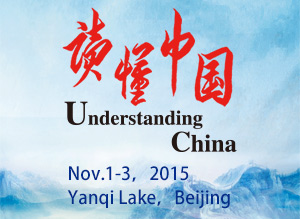
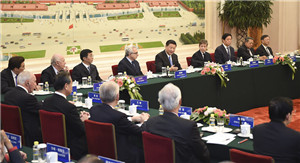
The 2nd "Understanding China" ConferenceOn November 1~3, 2015, the 2nd “Understanding China” Conference was held in Beijing Yanqi Lake International Conference Center. Zhang Gaoli, Vice Premier of the State Council, attended the opening ceremony.
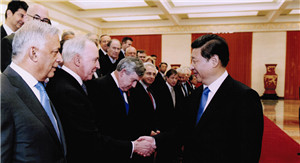
The 1st "Understanding China" ConferenceOn November 1~3, 2013, the 1st “Understanding China” Conference was held in Beijing, which was cosponsored by China Institute for Innovation & Development Strategy (CIIDS), Chinese People’s Institute of Foreign Affairs (CPIFA), and Berggruen Institute on Governance.
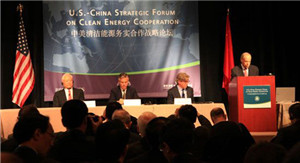
The 2nd U.S.-China Strategic Forum on Clean Energy CooperationWith the “Prospects for U.S.-China strategic cooperation in next decade” as its theme, the forum dwells on the implications of U.S.-China cooperation from the strategic perspective of coping with global challenges and maintaining world peace.
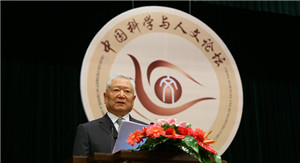
The China Sciences and Humanities ForumCo-initiated in April 2003 by renowned Chinese scientist Mr. Lu Yongxiang and influential political strategist Zhen Bijian, China Sciences and Humanities Forum was jointly hosted by Graduate University of Chinese Academy of Sciences (GUCAS) and the Higher Education Press.

